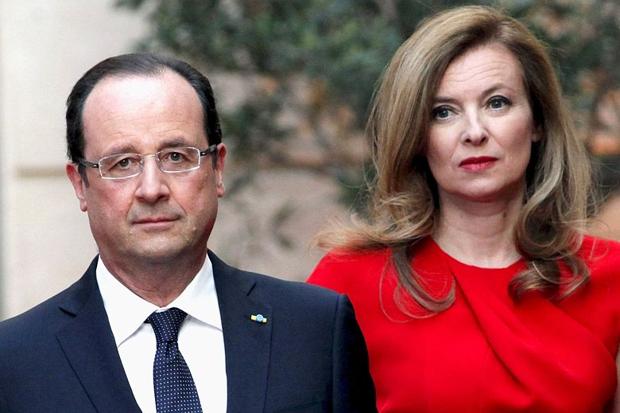François Hollande has let it known that he intends to become a bachelor president without a first lady, for the time being at least.
But Valérie Trierweiler, who was France’s de facto first lady until Mr Hollande ended their relationship this weekend, believes he is making a mistake.

In a conversation with French journalists, she said the head of state needed a women at his side – although she refrained from saying which one.
She also denounced the sexism and the treachery which she says reign in French politics – comments likely to anger Mr Hollande’s ruling Socialist Party, which claims be egalitarian and honest.
“How will we manage if there is no longer a first lady?” she said, according to iTélé, the rolling news channel. “Who will look after the Chinese first lady?”
Peng Liyuan, the superstar folk singer whose husband, Xi Jinping, is China’s President, is expected in Paris in April when she will accompany him on a keenly anticipated state visit.
French presidential aides now face the unenviable task of concocting a programme for Ms Peng in the absence of a first lady to show her around Paris, as usually happens on state visits.
The protocol conundrum is the latest consequence of the revelation by Closer, the glossy magazine, that Mr Hollande, 59, was having an affair with Julie Gayet, 41, the actress and film producer.
Ms Gayet, who has avoided public appearances since the disclosure, has reportedly told friends that she has no more desire to become first lady than Mr Hollande has to give her the role.
The assumption in Paris is that Mr Hollande will travel to Washington next month to meet Barack Obama without her and will continue to see her away from the Elysée Palace.
Ms Trierweiler, for her part, insisted that she remained good terms with the Socialist leader.
“We are not at war and we are continuing to telephone each other,” she said.
This was taken in Paris as a sign that he was likely to accept her demand for compensation for ending their decade-long relationship following Closer’s revelations.
However, her decision to meet journalists at the end of a long-planned charity trip to Mumbai will have appalled presidential advisers, who hope that she will disappear from the public eye.
Ms Trierweiler, 48, was described as relaxed by RTL radio, but tired and weak by Europe 1 radio. Alexandre Kara, its political correspondent, said her hands trembled as she spoke.
The former first lady, who was admitted to hospital for a week after discovering Mr Hollande’s affair said she was better but added: “I will perhaps suffer the repercussions in a month’s time.”
Ms Trierweiler said she had underestimated the sexism and bad faith prevalent in politics when arriving at the Elysée after Mr Hollande’s victory in the 2012 presidential election.
She said male politicians had little consideration for their female counterparts and even less for political wives.
“People don’t realise how much treachery and hypocrisy there is. You get hit without doing anything. That is not my way. In politics, a traitor is sometimes worth more than a friend.”
She said that her relationship with Mr Hollande might have survived if he had never been elected president, and added that some staff at the Elysée were in tears when she left on Saturday.
Ms Trierweiler, a journalist at Paris Match magazine, said she had no intention of going back to her previous post as political correspondent, but would carry on writing book reviews.
Her main aim, however, was to undertake charity work, she added in a comment that will fuel speculation that she hopes to become the French Diana, Princess of Wales.
She also rebutted claims that she was behind the unforeseen ascension which took Mr Hollande to the presidency. “I didn’t push him to become president and I never dreamt of entering the Elysée.”
In a final shot across her former partner’s bows, she rejected a claim by Nathalie Kosciusko-Morizet, the centre-right candidate to become Mayor of Paris, that Mr Hollande’s announcement that he was leaving her read “like a redundancy letter”.
“My separation is a break-up not a redundancy,” she said. “There was no notice.”
Article originally appeared in The Times newspaper.
Blog submitted by: Alex at The French Property Network - Cle France.